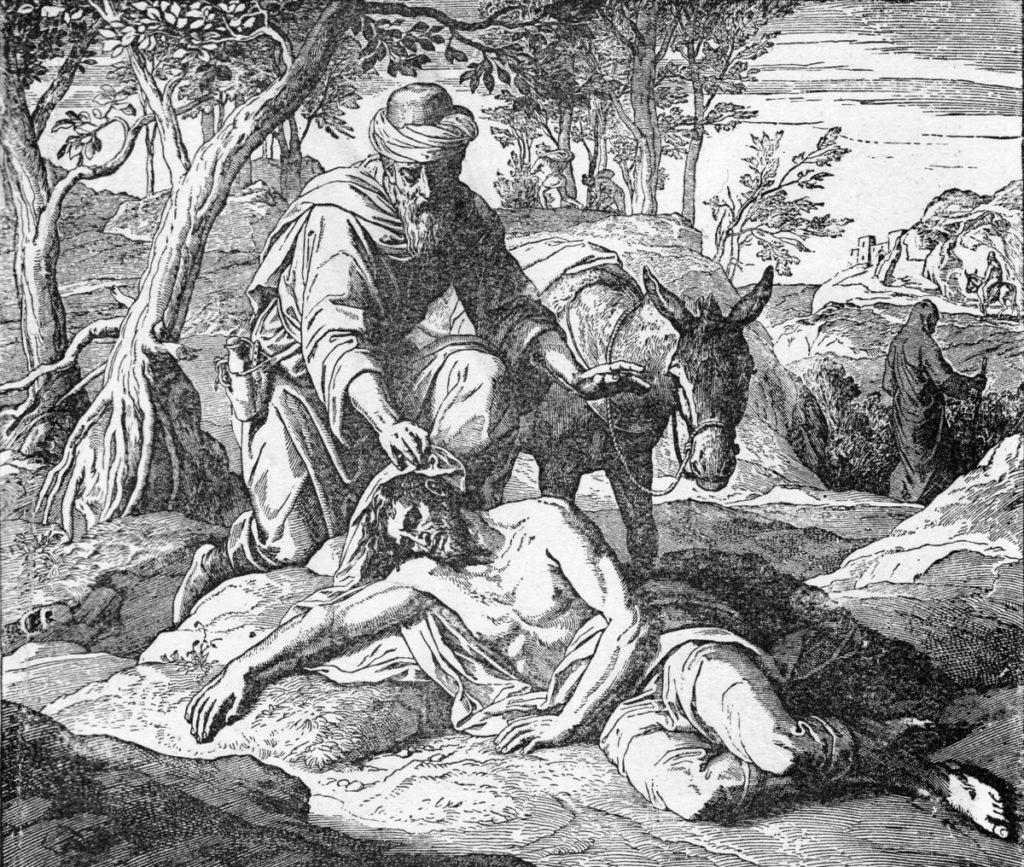The first obstacle we face when it comes to loving our neighbors is fear. We often teach our children at a young age about “stranger danger.” What is beneficial thinking for a child is not always a helpful way to think as an adult, yet we often carry that childhood warning with us throughout our adult lives. In the parable of the good Samaritan, perhaps the priest and Levite thought the situation was a ruse. What if they stopped to help and it was just a scam with robbers waiting to attack each of them? Our fear about what will happen to us if we get involved is one of the biggest inhibitors to loving our neighbors. It is cleaner, easier, and safer to stay disengaged—to be indifferent.
But indifferent people never make a difference.
Slowing Down to Love Our Neighbors
If not fear, then we are confronted with the tyranny of the urgency of our schedules. Time pressure can become a moral category for us. Perhaps the priest and Levite felt pressed to make it to an important meeting they were expected to be at. I know this can be true from my own life.
A few years ago, I was headed to a young-adult retreat that I was scheduled to lead. Retreats are always an amazing time with God, but they are often pressure packed for the leaders. There are countless logistics that need to be managed. Plus, there is the added weight of the sincere desire to see a breakthrough in the lives of people who have made the decision to come to the retreat.
That day, I was headed from Los Angeles to our local mountains with a lot to do as I prepared to welcome hundreds of young adults to the retreat starting later that evening. Suddenly, the freeway traffic slowed from a horrific accident that had just occurred. Like the priest and Levite, I did not see the event, but I did see the aftermath. There were no ambulances or sirens.
There was a man staggering in a confused and agitated state near a vehicle that was upside down in the far-right lane. He must have been ejected from the car. This is a bit graphic, but much of the skin on the left side of his face had been destroyed from sliding across the pavement. Next to him was an elderly woman who had pulled over to try to help him. She was having a hard time because he was a big guy. My first thought was I need to stop and help her with him. She can’t handle him alone.
True-confession time. This was my second thought: I really don’t have time for this right now. Depending on how long I am delayed, I might not get to the retreat in time to lead it. I have literally hundreds of people counting on me. For whatever reason, my better impulses prevailed. It’s not lost on me that they prevailed partly because I knew the story of the Good Samaritan. It was in me. The only question was whether it would be lived out by me. I stopped and helped calm the man and kept him safe until an ambulance arrived.
Rushing to leave, the elderly woman stopped me and said, “You know, hundreds of cars drove by without stopping to help. Maybe they all thought I had it handled. What made you stop?”
I told her, “I know you might think this is weird, but I stopped because I know that Jesus loves that man and he needed help.”
She said, “When I saw him, he was stumbling around on the road. I knew he needed help. But I was afraid because I know I am quite frail in my old age. I thought he might unintentionally hurt me in his confused state.”
Now she had me interested in how she overcame her fear and decided to help, so I asked her. With a delightful twinkle in her eye, she responded, “You might think this is weird, but I stopped because I know that Jesus loves that guy and he needed help.”

It’s not just priests or Levites of old that can be tempted to pass by and hurry along with internal justifications in mind. That can happen to me and you, too. Pressure can do that to us.
Years ago, researchers at Princeton University did a fascinating experiment based on this parable. They told seminary students that they needed to go across campus to another building. One group was told they were to prepare a talk about the parable of the Good Samaritan. To vary the felt urgency in the schedule, the researchers told one group that they were running late in making it across campus and told the other group they had a few minutes but should get moving anyway.
Along the way, the students passed a man sitting slumped in a doorway who moaned and coughed twice as they walked by. Unknown to the students, the moaning man was simply an actor playing the part. What the researchers discovered was that a person in a hurry is less likely to help people. This was true even of the students who were going to the other building to speak on the parable of the Good Samaritan!
Some literally stepped over the victim on their way to the next building. People in a hurry, hurry by people. Their results seemed to show that simply thinking about helping does not mean we will actually do it. We can be educated beyond our obedience. It also demonstrated that as the speed and pressure in our lives increase, our ethics suffer.[iv] As author Dallas Willard once said, to be a better follower of Jesus, we “must ruthlessly eliminate hurry” from our lives.[v]
Overcoming Skepticism to Love Our Neighbors
Even when fear for our safety and lack of time do not keep us from loving those in need, our skepticism can. Our thoughts can quickly jump to how they might misuse what we offer rather than to what we might offer that they could use. Skepticism can keep our guard up, which keeps our compassion down.
The needs of our neighbors can be much more than only economic, but imagine you pass a person with a sign asking for money. Living in an urban area, I am not oblivious to the fact that some people prey upon the generosity of others. That is a tragedy, because it hardens our hearts to those genuinely in need. However, the greater tragedy is to help no one to avoid being taken advantage of by someone.

Instead of allowing our skepticism to determine if we help, we can use it to helpfully shape how we help. For example, instead of giving money, we can walk with the people to a store to purchase the food they need. Sometimes slowing down can humanize our neighbors as we get to know their names as we walk together to meet their need. However, this may not always be possible. Keeping gift certificates with you for a nearby restaurant chain can be a wise way to meet the need without allowing skepticism to justify doing nothing.
Our built-in suspicion can impede our willingness to love our neighbors on a larger level. But maybe we could love our neighbors not only through individual acts of love but also through more systematic ways. So now in addition to loving one specific homeless neighbor, we decide to give our time, money, or resources to a homeless shelter. Yet that same skepticism can seek to thwart our moving forward with this plan. What if the organization does not steward my donation well? What if my time is wasted? Of course, there are ways around this, too, because we can often learn about the organization’s track record stewarding past resources given in advance of giving them ours.
Skepticism can even begin to shape our perceptions of the person in need, with little evidence to support it. Perhaps the priest and Levite saw the man bloodied on the side of the road and concluded, “He probably deserved it.” They could have presumed foolishness on the part of the man in need: “Well, he probably was carrying a large sum of money, and everyone knows you cannot do that on this road.” There is nothing in Jesus’ parable that communicates that someone’s past foolishness, even if actual, alleviates us from the responsibility to act lovingly.
Countless times I have heard people tell me that homeless people in Los Angeles “just need to get a job.” The rationalization goes something like this: “They are homeless because they are lazy, so why should I help them?” Yes, able-bodied and able-minded people in need should do what they can to improve their situations (see 2 Thessalonians 3:6-12). However, a high percentage of people experiencing homelessness suffer from mental illnesses of one form or another. Telling a person with debilitating paranoid schizophrenia to simply get a job is not always realistic. To the point, John Claypool observes, “Once a person is robbed and beaten and lying on the side of the road, elaborate speculation on how he got there is secondary to doing something about his wounds.”[vi]
How to Be a Hero
With the priest and Levite now having passed by, Jesus continues the parable. Most of his listeners certainly thought the third character would be just a regular, non-clerical Jew. Had he done that, Jesus would have made the listeners into the heroes of the story.
In a radical twist, the third person is a Samaritan. First-century Jews regarded Samaritans as loathsome and evil people. The Samaritans practiced a heretical version of Judaism and were ethnically distinct from the Jews. People of that day would not have expected any humane, heroic, or compassionate response from a Samaritan.
The Samaritan, presumably riding his donkey on the road, discovers the beaten man. He stops, gets off his donkey, and does what he can to help him. Apparently, sometimes we have to get off our donkeys to make a difference. He takes him to the nearest inn, where the wounded man would have long-term care. The Samaritan paid for all this out of his own pocket and promised to pay for any extra expenses.
This is a parable about loving our neighbors as we love ourselves, yet Jesus never tells us anything about the Samaritan’s feelings. In our world, we use the word love to mean many things. In the same breath, we can say that we “love” tacos and then turn around and say that we “love” our family members.
When Jesus talks about loving our neighbor, he is not mainly talking about feelings; he is talking about action. Theologian N. T. Wright captures this well:
As often in Jewish and Christian thought, “love” is first and foremost something you do, not something you feel; the feelings often follow the actions, not (as in some modern thinking) the other way around. . . . What “love” means first and foremost is taking thought for someone, taking care of them, looking ahead in advance for their needs, in the way that you would take careful thought about, and plan wisely for, your own life.[vii]
In other words, love does.[viii]
Jesus’ teachings show that many times action leads the heart. Authentic love does not come from only our feelings. Our feelings are not the only part of us. We also have our wills. Speaking about money (which the Samaritan had to have as well as use as part of his love for his neighbor), Jesus says, “Where your treasure is, there your heart will be also” (Matthew 6:21). Sometimes feelings follow the determination to do an act of love. Authentic feelings of indifference can be transformed by a genuine will to make a difference.
The Samaritan’s guarantee of paying any extra expenses incurred in the care of the hurting man is an important detail. In Jesus’ day, there were not credit cards. The man clearly had just been robbed, so he would not have had any cash. If the amount to nurse him back to health was more than what the Samaritan had paid, the owner of the inn would have been legally obligated to sell the man into slavery as a debtor, as the man would not have had the money to cover the debt. It was the law of the day. The Samaritan is guaranteeing that the man will be not only healthy but also free. Loving our neighbors can often require some thoughtful consideration about all their needs, not just the immediate ones.
All this talk of loving our neighbors can sometimes sound like we are talking about a legalistic, works-based salvation. The best succinct summary found in the Bible on how grace, faith, and good works are designed by God to all come together in our lives is found in Ephesians 2:8-10:
It is by grace you have been saved, through faith—and this is not from yourselves, it is the gift of God—not by works, so that no one can boast. For we are God’s handiwork, created in Christ Jesus to do good works, which God prepared in advance for us to do.
Martin Luther put it this way: “Salvation is by faith alone, but true faith never remains alone.”[ix] Grace does not free us from loving our neighbors. Grace is when God saves us so we now desire to love our neighbors well.
Thankfully, many Christians have taken this call to love our neighbors seriously. In fact, this is the mission of the number one nonprofit hospital network by size in the US, Ascension: “Rooted in the loving ministry of Jesus as healer, we commit ourselves to serving all persons with special attention to those who are poor and vulnerable.”[x] It started with just a few of Jesus’ followers trying love their neighbors well. It’s nonprofit, but last year its revenues were higher than that of Facebook, Starbucks, or Southwest Airlines. Additionally, four of the five largest nonprofit hospital networks in the US are run by Christians trying to live out Jesus’ concern for the poor and vulnerable.
It’s not just hospitals. Sociologists have shown that local churches create what is called a halo effect, with both social and economic uplift to the area, including to many people who are not part of the congregation.[xi] It’s amazing what can happen when each follower of Jesus takes seriously his commands. Of course, not every act of loving our neighbors will be noteworthy. As Fred Craddock once pointed out,
Most of us will not this week christen a ship, write a book, end a war, appoint a cabinet, dine with the queen, convert a nation, or be burned at the stake. More likely the week will present no more than a chance to give a cup of water, write a note, visit a nursing home, vote for a county commissioner, teach a Sunday school class, share a meal, tell a child a story, go to choir practice, and feed the neighbor’s cat.[xii]
Love does not have to be sensational to be love. Sometimes it is simply about being available and faithful.
You’ve been reading with Tom Hughes from Down to Earth: How Jesus’ Stories Can Change Your Everyday Life. Read a free excerpt from the beginning of the book here. Or get started on the YouVersion reading plan in English or Spanish.

[i] David Usborne, “Subway Hero: ‘I Had to Decide, Do I Let the Train Run Him Over,’” Independent, January 4, 2007, https://www.independent.co.uk/news/world/americas/subway-hero-i-had-to-decide-do-i-let-the-train-run-him-over-430718.html.
[ii] Usborne, “Subway Hero.”
[iii] John Wilkinson, “The Way from Jerusalem to Jericho,” The Biblical Archaeologist 38, no. 1 (March 1975): 10–24.
[iv] J. M. Darley and C. D. Batson, “From Jerusalem to Jericho: A Study of Situational and Dispositional Variables in Helping Behavior,” Journal of Personality and Social Psychology 27 (1973): 100–108, http://faculty.babson.edu/krollag/org_site/soc_psych/darley_samarit.html.
[v] Dallas Willard, quoted in John Ortberg, “Ruthlessly Eliminate Hurry,” Christianity Today, https://www.christianitytoday.com/pastors/2002/july-online-only/cln20704.html.
[vi] John Claypool, Stories, 95.
[vii] N. T. Wright, Evil and the Justice of God (Downers Grove, IL: IVP, 2013), 161.
[viii] Love Does is the great title of a book written by Bob Goff (Nashville: Thomas Nelson, 2012).
[ix] Martin Luther, quoted in Rich Nathan, “The Grace of Being Tender-Hearted,” Preaching Today, July 2013, https://www.preachingtoday.com/sermons/sermons/2013/july/grace-of-being-tender-hearted.html.
[x] “Mission, Vision and Values,” Ascension, https://www.ascension.org/Our-Mission/Mission-Vision-Values.
[xi] Joseph Sunde, “The Halo Effect: The Economic Value of the Local Church,” Acton Institute (blog), July 20, 2016, http://blog.acton.org/archives/88116-the-halo-effect-the-economic-value-of-the-local-church.html.
[xii] Fred B. Craddock, Luke: Interpretation: A Bible Commentary for Teaching and Preaching (Louisville, KY: John Knox, 2009), 192.

